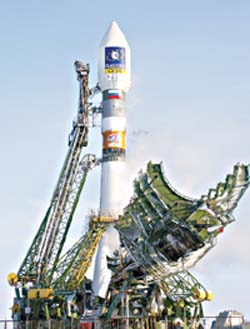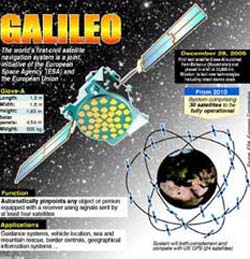| Home / International / International -- Update | Tools: Save | Print | E-mail | Most Read |
| Europe's 1st Galileo Program Satellite Launched |
| Adjust font size: |
The first test satellite of Europe's Galileo navigation system, designed to rival the reigning US-developed GPS system, was carried into space on Wednesday by a Russian rocket. The Russian Soyuz rocket carrying the GIOVE-A satellite blasted off from the Baikonur cosmodrome in Kazakhstan at 11:19 AM local time (05:19 GMT), said Vyacheslav Davidenko, spokesman for Russia's Federal Space Agency, quoted by the Itar-Tass news agency. The 3.8-billion-euros Galileo system is a network of 30 satellites intended for civilian use and will end Europe's reliance on the US-controlled GPS system. The GIOVE-A is the first of two satellites designed to test the technologies of the Galileo system. In orbit, the satellite will test atomic clocks and navigation signals, secure Galileo's frequencies in space and allow scientists to monitor how radiation affects the craft. Discussions are underway between the European Space Agency (ESA) and Russia to create a cooperation mechanism whereby Galileo can benefit from the experience gained during the development and operation of Russia's global satellite navigation system, the ESA said on its web site. Russia launched three satellites of its Global Navigation Satellite System (GLONASS) on Sunday, bringing the number of satellites in orbit for the system to 17. GLONASS will eventually have 24 satellites by the year 2010.
China is the first non-EU nation to have signed on to the Galileo programme. With a promised investment of € 200 million (US$244 million), Beijing inked the Galileo Project Co-operation Agreement on Civil Global Satellite Navigation with the European Commission in October 2003. Last year, the two sides met on several occasions to discuss details of the programme's implementation, including technological collaboration. In March, China Galileo Industries Ltd was established and entrusted the task of handling the country's interests in the project. The State-owned company will help commercialize the civilian use of the Galileo system in China. In July, seven Galileo projects were contracted to the Chinese side, including the development of a fisheries application system, special ionospheric studies and location based service standardization.
Israel and Ukraine have also signed on to the programme. Discussions are under way with India, Morocco, South Korea, Norway and Argentina, the EU said. (Xinhua News Agency, China Daily December 29, 2005) |
| Tools: Save | Print | E-mail | Most Read |
 |
| Related Stories |

